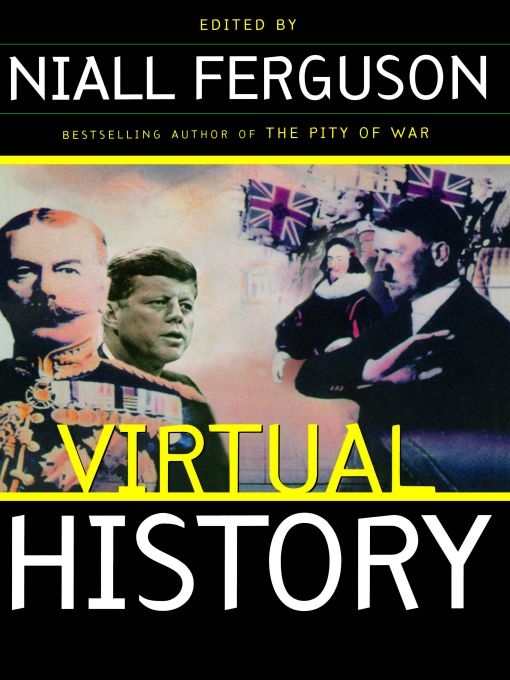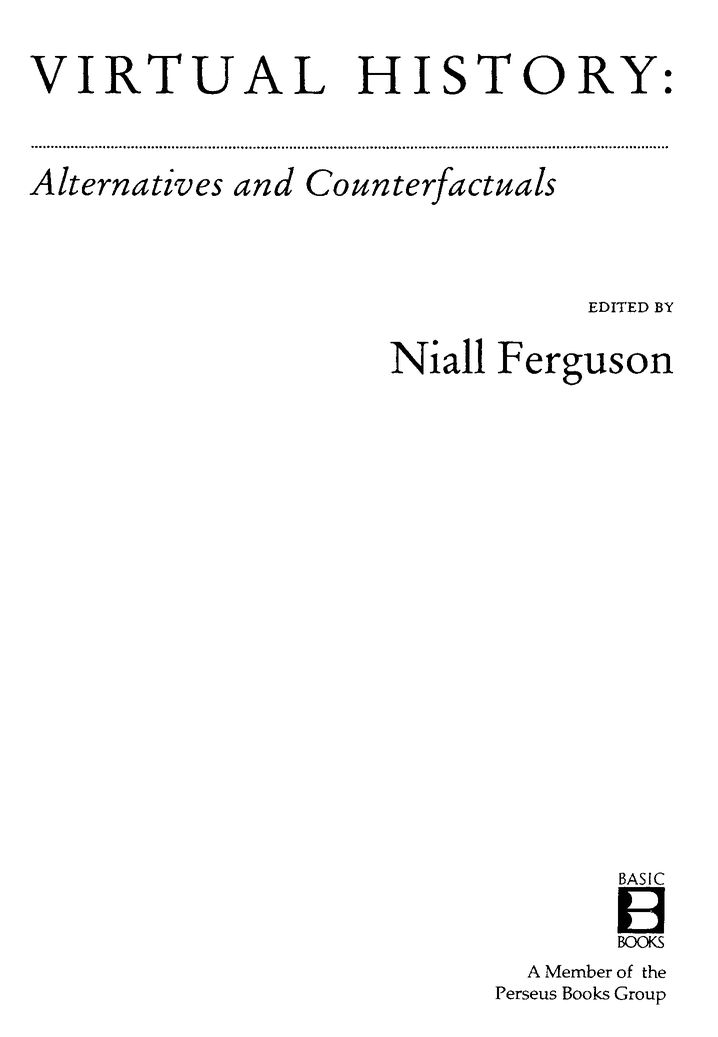Virtual History: Alternatives and Counterfactuals
Read Virtual History: Alternatives and Counterfactuals Online
Authors: Niall Ferguson

BOOK: Virtual History: Alternatives and Counterfactuals
9.78Mb size Format: txt, pdf, ePub

Table of Contents
VIRTUAL HISTORY
Niall Ferguson is Fellow and Tutor in Modern History at Jesus College, Oxford. He recently published
Paper and Iron: Hamburg Business and German Politics in the Era of Inflation 1897-1927
which was shortlisted for the
History Today
Book of the Year award. He has also written numerous articles on nineteenth- and twentieth-century financial history, including a critique of Keynes’s
Economic Consequences of the
Peace and is the author of a history of the Rothschilds. A prolific commentator on contemporary politics, he lives with his wife and two children in Oxfordshire.
Paper and Iron: Hamburg Business and German Politics in the Era of Inflation 1897-1927
which was shortlisted for the
History Today
Book of the Year award. He has also written numerous articles on nineteenth- and twentieth-century financial history, including a critique of Keynes’s
Economic Consequences of the
Peace and is the author of a history of the Rothschilds. A prolific commentator on contemporary politics, he lives with his wife and two children in Oxfordshire.

Virtual History
was first published in hardcover in Great Britain by Picador in 1997. The Basic Books edition is reprinted by arrangement with Papermac, an imprint of Macmillan Publishers Ltd.
was first published in hardcover in Great Britain by Picador in 1997. The Basic Books edition is reprinted by arrangement with Papermac, an imprint of Macmillan Publishers Ltd.
This collection copyright © Niall Ferguson 1997
Published 1999 by Basic Books,
A Member of the Perseus Books Group.
A Member of the Perseus Books Group.
All rights reserved. Printed in the United States of America. No part of this book may be reproduced in any manner whatsoever without written permission except in the case of brief quotations embodied in critical articles and reviews. For information, address Basic Books, 10 East 53rd Street, New York, NY 10022-5299.
Typeset by CentraCet, Cambridge
A CIP catalog record for this book is available from the Library of Congress.
ISBN-10: 0-465-02323-1
eISBN : 97-8-078-67257-9
ISBN-13: 978-0-465-02323-3
Contributors
NIALL FERGUSON is Fellow and Tutor in Modern History at Jesus College, Oxford. He recently published
Paper and Iron: Hamburg Business and German Politics in the Era of Inflation 1897-1927
(1995), which was shortlisted for the
History Today
Book of the Year award. He has written numerous articles on nineteenth- and twentieth-century financial history, and is currently writing a history of Rothschilds.
Paper and Iron: Hamburg Business and German Politics in the Era of Inflation 1897-1927
(1995), which was shortlisted for the
History Today
Book of the Year award. He has written numerous articles on nineteenth- and twentieth-century financial history, and is currently writing a history of Rothschilds.
JOHN ADAMSON is a Fellow of Peterhouse, Cambridge, and has published extensively on the political and cultural history of seventeenth-century Britain. He won the Royal Historical Society’s Alexander Prize in 1990, and is currently editing the official history of
The Commons: 1640-1660
for the History of Parliament Trust.
The Commons: 1640-1660
for the History of Parliament Trust.
JONATHAN CLARK is Joyce and Elizabeth Hall Distinguished Professor of British History at the University of Kansas. His publications include
The Dynamics of Change
(1982),
English Society 1688-1832
(1985),
Revolution and Rebellion
(1986),
The Language of Liberty, 1660-1832: Political Discourse and Social Dynamics in the Anglo-American World
(1993) and
Samuel Johnson: Literature, Religion and English Cultural Politics from the Restoration to Romanticism
(1994). He has edited
The Memoirs and Speeches of James, 2nd Earl Waldegrave 1742-1763
(1988) and
Ideas and Politics in Modern Britain
(1989).
The Dynamics of Change
(1982),
English Society 1688-1832
(1985),
Revolution and Rebellion
(1986),
The Language of Liberty, 1660-1832: Political Discourse and Social Dynamics in the Anglo-American World
(1993) and
Samuel Johnson: Literature, Religion and English Cultural Politics from the Restoration to Romanticism
(1994). He has edited
The Memoirs and Speeches of James, 2nd Earl Waldegrave 1742-1763
(1988) and
Ideas and Politics in Modern Britain
(1989).
ALVIN JACKSON is Reader in Modern History at the Queen’s University of Belfast, and has been Lecturer in Modern Irish History at University College Dublin and John Burns Visiting Professor of Irish Studies at Boston College. He is author of
The Ulster Party
(1989),
Sir Edward Carson
(1993) and
Colonel Edward Saunderson: Land and Loyalty in Victorian Ireland
(1995). He is at present working on the Blackwell History of Modern Ireland.
The Ulster Party
(1989),
Sir Edward Carson
(1993) and
Colonel Edward Saunderson: Land and Loyalty in Victorian Ireland
(1995). He is at present working on the Blackwell History of Modern Ireland.
ANDREW ROBERTS was an Honorary Senior Scholar at Gonville and Caius College, Cambridge. His books include
The Holy Fox, A Biography of Lord Halifax
(1991),
Eminent Churchillians
(1994) and
The Aachen Memorandum
(1995). He is currently writing the authorized biography of the 3rd Marquess of Salisbury.
The Holy Fox, A Biography of Lord Halifax
(1991),
Eminent Churchillians
(1994) and
The Aachen Memorandum
(1995). He is currently writing the authorized biography of the 3rd Marquess of Salisbury.
MICHAEL BURLEIGH is Distinguished Research Professor of History at the University of Wales, Cardiff. His books include
Prussian Society and the German Order
(1984),
Germany Turns Eastwards: A Study of ‘Ostforschung’ in the Third Reich
(1988),
The Racial State: Germany 1933-1945
(with Wolfgang Wippermann, 1991),
Death and Deliverance: ‘Euthanasia’ in Germany, 1900-1945
(1994) and
Confronting the Nazi Past
(1996). His essays,
Ethics and Extermination: Essays on Nazi Genocide
will be published shortly. His award-winning Channel 4 Documentaries include
Selling Murder and Heil Herbie.
Prussian Society and the German Order
(1984),
Germany Turns Eastwards: A Study of ‘Ostforschung’ in the Third Reich
(1988),
The Racial State: Germany 1933-1945
(with Wolfgang Wippermann, 1991),
Death and Deliverance: ‘Euthanasia’ in Germany, 1900-1945
(1994) and
Confronting the Nazi Past
(1996). His essays,
Ethics and Extermination: Essays on Nazi Genocide
will be published shortly. His award-winning Channel 4 Documentaries include
Selling Murder and Heil Herbie.
JONATHAN HASLAM is a Fellow and Director of Studies in History at Corpus Christi College, Cambridge, and Assistant Director of Studies in International Relations at the Cambridge University Centre of International Studies. He is the author of
The Soviet Union and the Struggle for Collective Security in Europe 1933-1939
(1984) and
The Soviet Union and the Threat from the East 1933-1941
(1992). He has recently completed a biography of E. H. Carr and is currently writing
The Realist Tradition in International Relations: from Machiavelli to Waltz.
The Soviet Union and the Struggle for Collective Security in Europe 1933-1939
(1984) and
The Soviet Union and the Threat from the East 1933-1941
(1992). He has recently completed a biography of E. H. Carr and is currently writing
The Realist Tradition in International Relations: from Machiavelli to Waltz.
DIANE KUNZ is Associate Professor of History at Yale University. She is the author of
The Battle for Britain’s Gold Standard in 1931
(1987) and
The Economic Diplomacy of the Suez Crisis
(1991). Her most recent book is
Butter and Guns: America’s Cold War Economic Diplomacy.
The Battle for Britain’s Gold Standard in 1931
(1987) and
The Economic Diplomacy of the Suez Crisis
(1991). Her most recent book is
Butter and Guns: America’s Cold War Economic Diplomacy.
MARK ALMOND is Lecturer in Modern History at Oriel College, Oxford. His most recent book is
Revolution: 500 Years of Struggle for Change
(1996). His other books include
Europe’s Backyard War: the War in the Balkans
(1994) and
The Rise and Fall of Nicolae
and
Elena Ceausescu
(1992).
Revolution: 500 Years of Struggle for Change
(1996). His other books include
Europe’s Backyard War: the War in the Balkans
(1994) and
The Rise and Fall of Nicolae
and
Elena Ceausescu
(1992).
Acknowledgements
In a collaborative volume, it is for individual contributors to express their gratitude in their notes. The editor, however, has the right to a list of acknowledgements in a larger typeface. I would like to express my thanks to: the Modern History Faculty, Oxford; the Acting Principal and Fellows of Jesus College, Oxford; my agent, Georgina Capel, of Simpson, Fox Associates; Peter Straus and Tanya Stobbs, my editors at Macmillan; Glen O‘Hara of Jesus College, Oxford, for his indispensable assistance with the research for both the introduction and my chapter; and Vivien Bowyer at Jesus College, Oxford. I am especially indebted for their comments on my sections of the book to Dr Christopher Andrew of Corpus Christi College, Cambridge; Professor Jonathan Clark of the University of Kansas; Professor Roy Foster of Oxford University; Dr Jonathan Steinberg of Trinity Hall, Cambridge ; Dr John Stevenson of Worcester College, Oxford; and Professor Norman Stone of Oxford University. Many other friends and colleagues too numerous to name have assisted me by patiently fielding questions about the theory and practice of counterfactual history over coffee, lunch and dinner. Above all, I would like to thank my wife Susan for providing inspiration.
INTRODUCTION
Virtual History: Towards a ‘chaotic’ theory of the past
Niall Ferguson
Acted history ... is an ever-living, ever-working Chaos of Being, wherein shape after shape bodies itself forth from innumerable elements. And this Chaos ... is what the historian will depict, and scientifically gauge!
THOMAS CARLYLE
ANDRÉ MAUROIS
LEWIS NAMIER
JOHAN HUIZINGA
The obvious objection to such hypothetical or ‘counterfactual’ questions is simple: why bother asking them? Why concern ourselves with what
didn’t
happen? Just as there is no use crying over spilt milk, runs the argument, so there is no use in wondering how the spillage might have been averted. (Even more futile to speculate what would have happened if we
had
spilt milk that’s still safe in the bottle.)
didn’t
happen? Just as there is no use crying over spilt milk, runs the argument, so there is no use in wondering how the spillage might have been averted. (Even more futile to speculate what would have happened if we
had
spilt milk that’s still safe in the bottle.)
One easy response to that objection is that we constantly ask such ‘counterfactual’ questions in our daily lives. What if I had observed the speed limit, or refused that last drink? What if I had never met my wife or husband? What if I had bet on Red Rum instead of Also Ran? It seems we cannot resist imagining the alternative scenarios: what might have happened, if only we had or had not ... We picture ourselves avoiding past blunders, or committing blunders we narrowly avoided. Nor are such thoughts mere day-dreams. Of course, we know perfectly well that we cannot travel back in time and do these things differently. But the business of imagining such counterfactuals is a vital part of the way in which we learn. Because decisions about the future are - usually - based on weighing up the potential consequences of alternative courses of action, it makes sense to compare the actual outcomes of what we did in the past with the conceivable outcomes of what we might have done.
Other books
Never Say Never by Kelly Mooney
In the Middle by Sindra van Yssel
Tempted Tigress by Jade Lee
The Best Thing for You by Annabel Lyon
Matecumbe by James A. Michener
La Torre de Wayreth by Margaret Weis & Tracy Hickman
Worst Laid Plans (A Maddox Storm Mystery Book 1) by Claire Robyns
The Time of the Clockmaker by Anna Caltabiano
Some Day Somebody by Leger, Lori
The Broken Kings: Book Three of The Merlin Codex by Robert Holdstock
